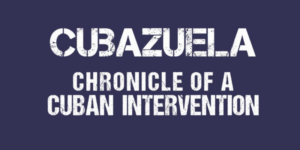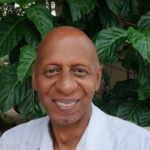The Cuban Communist Party’s days of unquestioned hegemony are over, a normally sympathetic commentator suggests.
While people across Cuba protested shortages of food and medicine amid a higher number of Covid-19 cases, rising prices due to inflation and hours-long power outages, many also chanted “libertad” (freedom) and “We want change,” while holding signs that read, “Down with the dictatorship.” In a country like Cuba where the government has significant control over many aspects of life, including industries, wages, imports and prices of goods, it’s all intertwined, NBC’s Carmen Sesin reports.
Independent journalist Yoani Sánchez tweeted, “We were so hungry, we ate our fear.”
Is Cuba’s Communist Party Finally Losing Its Hold on the Country? https://t.co/b4g652nBI7 via @NewYorker
— Democracy Digest (@demdigest) July 22, 2021
The paradox for President Miguel Díaz-Canel, who is said by people who know him personally to want to be a reformer, is that he is boxed in by circumstances, claims Jon Lee Anderson, the author of “Che Guevara: A Revolutionary Life:”
Having been embarrassed by the Cuban uprising, he must show strength in order to preserve order. But to placate the public’s rising frustrations, he must also signal moderation, which he has belatedly tried to do; in a second address, on Wednesday, he acknowledged that his government bore responsibility for the issues that had sparked the protests, including both the shortages and the rising prices of food and medicine. But to call for dialogue, or else to “open up,” as many outsiders—the European Union and Pope Francis, among others—have urged him to do, could telegraph weakness to the boldest Cuban dissidents, and provoke new demonstrations.
![]() In any event, it seems a certainty that the unrest in Cuba has not ended, Anderson writes for The New Yorker. If the Cuban Communist Party wants to survive, its denizens will have to face up to the reality that its days of unquestioned hegemony are over, and it will have to agree to share power with Cubans who have other points of view, and to give them an equal opportunity to find solutions to the problems of Cuba that they have proved unable to address, he suggests.
In any event, it seems a certainty that the unrest in Cuba has not ended, Anderson writes for The New Yorker. If the Cuban Communist Party wants to survive, its denizens will have to face up to the reality that its days of unquestioned hegemony are over, and it will have to agree to share power with Cubans who have other points of view, and to give them an equal opportunity to find solutions to the problems of Cuba that they have proved unable to address, he suggests.
A statement from U.S. Senator Bob Menendez (D-N.J.), Chairman of the Senate Foreign Relations Committee, and several European counterparts called for “targeted sanctions on members of the Cuban Revolutionary Armed Forces, the Cuban Ministry of Interior, Cuba’s National Revolutionary Police, and all those who are complicit in the violent repression of peaceful protests or violations of human rights.”
“In solidarity with the international community and the families of activists and journalists unjustly detained, we call on the regime to immediately release all those arrested for asserting their fundamental freedoms and universal rights…..[and] to establish a constructive dialogue, including the participation of a broad range of civil society actors, and lay out a path for a democratic and prosperous Cuba,” the statement added.
 Javier Larrondo, a representative of the human rights organization Cuban Prisoners Defenders, said authorities would likely lock up the most charismatic and effective opposition leaders, who lately have often been young artists, whether or not they were at the protests.
Javier Larrondo, a representative of the human rights organization Cuban Prisoners Defenders, said authorities would likely lock up the most charismatic and effective opposition leaders, who lately have often been young artists, whether or not they were at the protests.
“We will have hundreds of political prisoners in just two weeks,” he told Reuters.
But are the protests significant enough to change the country’s one-party political system? NBC’s Sesin asks.
“I think some caution is in order,” said Michael Bustamante, an assistant professor of Latin American history at Florida International University. What was remarkable about the protests was that they could not have been predicted and they were decentralized in the way they unfolded.
“It wasn’t called for by the opposition, let alone the government. It just kind of happened,” Bustamante said. “I think that supposes real challenges if you wanted to channel this into something. How do you do that?”
Cuba’s tightly controlled state security apparatus is likely to keep the Communist Party in power for the foreseeable future, say CSIS analysts Ryan C. Berg and Rodrigo Castillo Perez. Its model of social control, the number of informants, and the ratio of secret police to the population—estimated to be higher than that of the Stasi in East Germany—is likely to insulate the regime from any sort of imminent collapse. Beyond regime security, however, the Cuban government may engage in some short-term loosening of economic restrictions.
So far, there have been several notable resignations of Cuban government officials, but none signal sufficient discontent with the government to threaten state security, they add. Purportedly, internal dissent has emerged between young and older generations in the military, but any fissures that emerge are not likely to be serious enough to threaten regime security.
 “It is without a doubt a watershed moment in the history of Cuba,” said Sebastian Arcos, associate director of FIU’s Cuban Research Institute. While there is a “deepening economic crisis compounded by a health crisis and, of course, Covid,” the demonstrations were not “grievances for economic issues or local government issues,” he explained.
“It is without a doubt a watershed moment in the history of Cuba,” said Sebastian Arcos, associate director of FIU’s Cuban Research Institute. While there is a “deepening economic crisis compounded by a health crisis and, of course, Covid,” the demonstrations were not “grievances for economic issues or local government issues,” he explained.
“They were openly, politically radicalized against the regime,’’ he said. “The chants for freedom, down with (Cuban President) Díaz-Canel, down with Communism. The population doesn’t believe the narrative (of the Cuban government) anymore.”
Martin Palous, director of the Vacláv Havel Program for Human Rights and Diplomacy, agreed. “This moment is not only about one concrete issue or shortage of something, it’s about the reunification of the Cuban nation,’’ he told an FIU forum on the protests. “People around the world are excited. They feel that there is something in the air. It’s a question of Cuban identity and Cuba’s future.”

YouTube screen grab
Contrary to claims that Cuba has ended racial inequality, Afro-Cubans such as NED Democracy award winner “Antunez” (right) suffer from systemic racism, a leading expert attests.
When Castro’s government came to power, it declared an end to racism. And since there was no racism, they also outlawed all Afro Cuban organizations and centers of the Afro Cuban community, says Penn associate professor Amalia Dache. It would have been as if the United States had outlawed the NAACP and Black churches after the Civil Rights Act passed. Black Lives Matter would not be allowed to exist in Cuba today, she observes:
I spoke to people whose access to education ….was cut off because they wouldn’t align with the communist party – the party that rules all Cuban civil society, all institutions, including systems of education. Cuba’s president calls the predominantly Afro Cuban neighborhoods with high rates of poverty where these protests started marginalized. How could there be marginalized neighborhoods in a supposed post-racial egalitarian society?
Imperial Overreach
The CubaZuela nexus has turned from a strategic advantage to a major liability for the regime, Daniel Raisbeck writes for Reason.
 Now that Cuba’s supposedly submissive population is bravely standing up for its freedom in Havana itself, rumors abound of Cubans stationed in Venezuela being summoned back to the island to quash the rebellion, he contends. It’s a classic case of imperial overreach, much like that of Spartans lording it over much of Greece, only to face a sudden helot revolt at home.
Now that Cuba’s supposedly submissive population is bravely standing up for its freedom in Havana itself, rumors abound of Cubans stationed in Venezuela being summoned back to the island to quash the rebellion, he contends. It’s a classic case of imperial overreach, much like that of Spartans lording it over much of Greece, only to face a sudden helot revolt at home.
“What’s different about the protests in Cuba by comparison to those in Venezuela and Nicaragua is that Cubans have been operating in a closed and repressive system for decades,” said Paul J. Angelo, a fellow for Latin American studies at the Council on Foreign Relations.
In other Latin American countries, protest movements have been common and recurring since the countries transitioned to authoritarian rule.
 “Just as democratization processes across Latin America followed different paths and responded to different internal and external inducements during the 1980s and 1990s,” Angelo told NBC, “so too will the democratization processes of the 2020s — if we can achieve them.”
“Just as democratization processes across Latin America followed different paths and responded to different internal and external inducements during the 1980s and 1990s,” Angelo told NBC, “so too will the democratization processes of the 2020s — if we can achieve them.”
Joe Garcia, a Cuban American and a former Democratic congressman from Miami who was recently in Cuba and often serves as an informal intermediary between the U.S. and Cuban governments, said that Díaz-Canel, a protégé of Raul Castro, had stumbled in his first big test since becoming President, in 2018, the New Yorker’s Anderson writes. “For the first time in six decades, the Cubans have seen a leader blink,” Garcia said. “This problem isn’t going away.”
Dina Stars, an independent journalist and YouTube star who has been covering the protests in Cuba, was rounded up by police during a television appearance on Tuesday. During her appearance on Spain’s Cuatro TV, she was speaking to Marta Flich when she announced in Spanish that state police were outside, the Wrap reports (below).
Independent journalist @Dinastars_ was live on the air today with a tv station in Spain when Cuban regime state security entered her home & ask that she come with them. #SosCuba #PatriaYVida pic.twitter.com/VV83uQViDw
— Marco Rubio (@marcorubio) July 13, 2021

 “What these protests show is that people are able to overcome their fear, and that’s why the government has refused to reestablish the Internet service,”
“What these protests show is that people are able to overcome their fear, and that’s why the government has refused to reestablish the Internet service,” 





